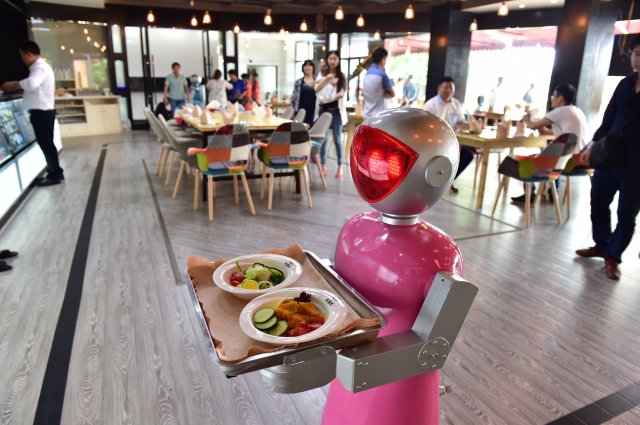A “female” robot waiter in China. Credit: VCG via Getty

Globalisation has put to the test both the economics and the politics of the idea of “comparative advantage.” While the economics of it seem to be working fine, the politics, isn’t going so well.
The theory seems simple enough: each nation should focus on the things it does best, and trade for everything else. It’s attributed to 19th century English economist David Ricardo, since when it has been the basic idea behind “free trade”.[1. Simple on the surface, comparative advantage is a bit more complex than it seems as it’s not about absolute advantage (A just makes things cheaper than B) but opportunity cost. Also, some writers now attribute the theory not to Ricardo but to James Mill. But Ricardo’s memorable example stands: Portugal should focus on making wine, and Britain on cloth.]
China’s big comparative advantage has been cheap labour, and as a result it’s yanked great swathes of manufacturing out of the US economy. Retail behemoth Walmart, for example, works with 5,000 different Chinese suppliers. That’s a lot of stuff American workers aren’t making any more. On the other hand, that’s a lot of stuff American workers can buy very cheaply.
Yet this worry has a very 20th century feel. We should, instead, be looking ahead. For the problem isn’t going to be cheap human labour – it’s going to be nearly-free machine labour. We should be far more concerned about what Norbert Wiener, the “father of cybernetics” called the emergence of a new slave economy.
The conventional wisdom, of course, is that automation is always good for us. It won’t eat our jobs. Like the first Industrial Revolution, every tech disruption since has led to more and better jobs. Some of us have been challenging this view for years, and either been ignored or told not to rock the innovation boat. Make what you will of his politics, Jeremy Corbyn is so far the only political leader in the west to have noted this challenge in a major speech.
In any event, the widely-held view of the first Industrial Revolution is simplistic. Andy Haldane, chief economist of the Bank of England, recently made that clear. It did huge damage done to skilled labour markets that lasted a generation and more.
And Ricardo himself, who was living through the dramatic changes, had more than a little sympathy for the Luddites.[2. The original Luddites were worried about their jobs, and took the law into their own hands – with an occasional riot and many incidents of what was called “machine-breaking”. The government sent in the army. Hangings followed. Things calmed down.] But, believer that he was in comparative advantage, he wrote that if Britain didn’t employ these new technologies other nations would anyway.
Back to the future, in a 2013 report by two Oxford economists, they analyse the susceptibility of 702 different jobs being done by machines. The report concluded that the job most likely to disappear to machines was telemarketing. It struck me when I read the report that that calls from robotic, metallic, voices delivering potted sales pitches would be easy to hang up on. How could a computer programme really “sell”?
Well, Google has just proved once and for all that telemarketers are history. Every single one of them, worldwide. And also everyone else who earns a living talking on the phone. Listen to these sample calls, as a robot makes a hair appointment and books a table for dinner and see if you can tell which of the speakers is a machine. The impact is stunning.
And so here we are again, on the cusp of an automation revolution in which what economists politely call “technological unemployment” is going to be a major challenge.
In one of the most ridiculous public statements ever, US Treasury Secretary Stephen Mnuchin blithely assured the American public that not only are their jobs safe from automation, but the issue is “not even on our radar screen”. Any such effects are “50 to 100 more years” away.
As an American President keeps faith with his voters by starting a global trade war, we can only imagine what’s in store once he (and they) work out where the real threat to fly-over country jobs lies.










Join the discussion
Join like minded readers that support our journalism by becoming a paid subscriber
To join the discussion in the comments, become a paid subscriber.
Join like minded readers that support our journalism, read unlimited articles and enjoy other subscriber-only benefits.
Subscribe